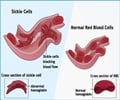A new evidence-based guideline for managing sickle cell disease (SCD) has been created by an expert panel.

In 2009, the National Heart, Lung, and Blood Institute convened an expert panel that developed the Evidence-Based Management of Sickle Cell Disease: Expert Panel Report 2014. Barbara P. Yawn, M.D., M.Sc., M.S.P.H., of the Olmsted Medical Center, Rochester, Minn., and colleagues produced a summary of this report and conducted a search of the medical literature to examine the strength of the quality of evidence for the recommendations.
Among the strong recommendations:
• For prevention: daily oral prophylactic penicillin up to the age of 5 years, annual transcranial Doppler examinations from the ages of 2 to 16 years in those with sickle cell anemia, and long-term transfusion therapy to prevent stroke in those children with abnormal transcranial Doppler velocity (elevated speed of blood flow in the cerebral arteries).
• To address acute complications: rapid initiation of opioids for treatment of severe pain associated with a vasoocclusive crisis (blockage of blood flow due to the abnormal "sickled" red blood cells getting stuck in the blood vessels) and use of incentive spirometry (a method of encouraging deep breathing with the use of an instrument to provide feedback) in patients hospitalized for a vasoocclusive crisis.
• For chronic complications: use of analgesics and physical therapy for treatment of avascular necrosis (a condition in which poor blood supply to an area of bone leads to bone death) and use of angiotensin-converting enzyme inhibitor therapy for microalbuminuria (a subtle increase in the urinary excretion of the protein albumin that cannot be detected by a conventional urinalysis) in adults with SCD.
Advertisement
•A recommendation of moderate strength suggests offering treatment with hydroxyurea without regard to the presence of symptoms for infants, children, and adolescents.
Advertisement
"The process of developing guidelines for the management of children, adolescents, and adults with SCD has been challenging because high-quality evidence is limited in virtually every area related to SCD management. The systematic review of the literature identified a very small number of randomized clinical trials in individuals with SCD, demonstrating the extensive knowledge gaps in SCD and care of affected individuals. The expert panel realizes that this summary report and the guidelines leave many uncertainties for health professionals caring for individuals with SCD and highlight the importance of collaboration between primary care health professionals and SCD experts. However, we hope that this summary report and the SCD guideline begins to facilitate improved and more accessible care for all affected individuals, and that the discrepancies in the existing data will trigger new research programs and processes to facilitate future guidelines," the authors conclude.
Source-Eurekalert









